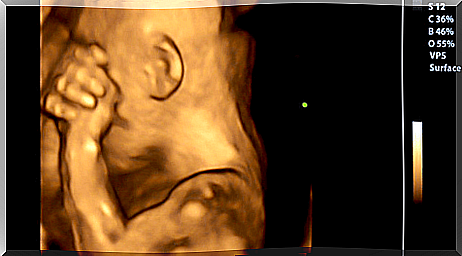This Is What The Baby Experiences When You Cry Of Sadness During Pregnancy

The experience of your baby when he is inside your womb is absolutely connected with what happens to you. In that moment, you are his everything. You are his closest contact with the outside world and also with his inner world.
Science has shown that during pregnancy your baby feels the same as you and with the same intensity. And if you cry out of sadness, your baby will experience this emotional state firsthand; he will feel as if all that sadness and anguish were his.
During the gestation stage, your baby is preparing for life and does so through the messages that you as a mother provide him, says Curt A. Sandman, one of the scientists who participated in a study recently conducted at the University of California -Irvine that shows that the change in the mother’s mental state influences the development of her baby before and after birth.
This research proves that when a baby is inside its mother’s womb, it is an active participant in its own development, especially since during this period it is collecting information for life after birth. And one of the most impressive findings of the scientific work in which Elysia P. Davis and Laura M. Glynn also participated is that the baby can feel the psychological state of his mother.
The placenta receives the hormonal signals that derive from sadness

Thus, if the mother is severely sad or depressed, the baby feels it. This emotional state affects their development for much of their life. In the long term, having a depressed mother could lead to neurological problems and psychiatric disorders, Sandman says.
What’s more, the same team of scientists found in a previous study that older children whose mothers were anxious during pregnancy, which is often a symptom of depression, have differences in certain brain structures. However, decades of studies will be needed to determine exactly what having a depressed mother means for a child’s long-term health.
Emotional changes influence the emotional development of the baby
It’s a fact: The change in a mother’s mental state can influence her baby’s development before and after birth.

That is why the ideal in this type of case is to treat prenatal depression, a disease with which science already knows how to deal, however the problem, according to the scientists, is that women rarely undergo a psychological evaluation or before the birth of your baby.
The best thing to do during the gestation period is for the mother to have a balanced emotional state, to feel calm, as this will make the baby develop better.
What most affects the development of the child, according to the study, is the persistent fluctuation of the emotional state of the mother, since the baby also becomes unbalanced when he senses the short periods of happiness of his mother and then unexpectedly changes to one of sadness or stress. These imbalances affect the development of the baby during and after pregnancy, so it is essential to have an emotional balance.
For their part, a group of prenatal psychologists ensures that the baby, in addition to perceiving his mother’s feelings, also perceives her thoughts, which also influence the way in which the baby molds itself.
In this sense, the baby of a mother who did not want her pregnancy feels the rejection that she feels for him, which creates future emotional problems.
Ideally, in this important stage, in which such close ties are created with the baby, you try to feel calm. Avoid experiencing stress or negative feelings at all costs; For this you can perform meditation, relaxation or yoga exercises. They can all help you overcome anxiety and sadness.









